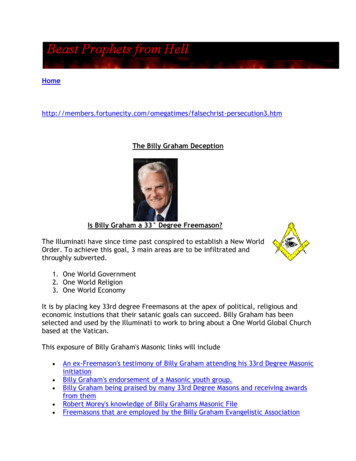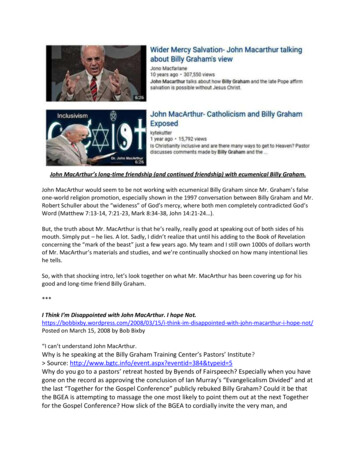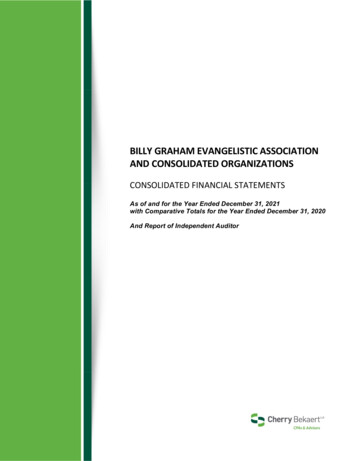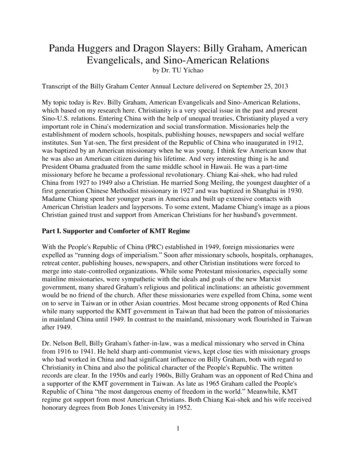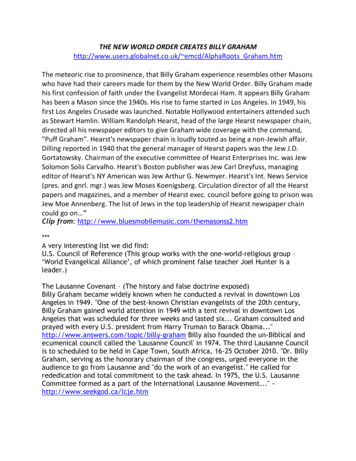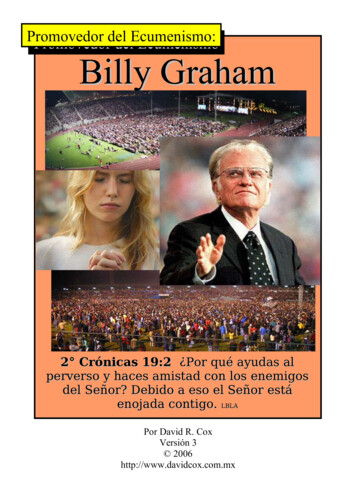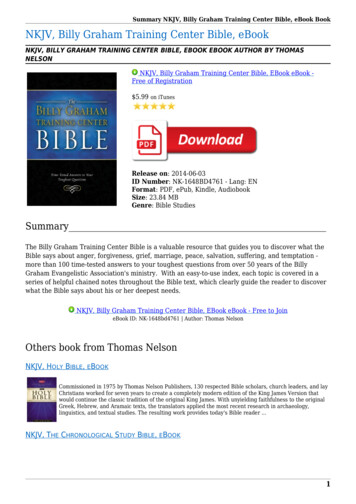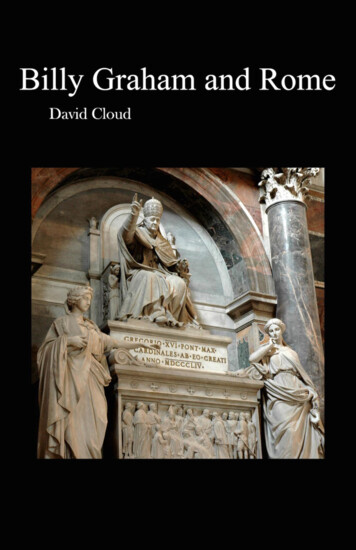
Transcription
Billy Graham and RomeCopyright 2006 by David CloudThis edition October 26, 2014ISBN 1-58318-098-2This book is published for free distribution in eBook format.It is available in PDF, Mobi (for Kindle, etc.), and ePubformats from the Way of Life web site. We do not allowdistribution of this book from other web sites.Published by Way of Life LiteraturePO Box 610368, Port Huron, MI 48061866-295-4143 (toll free) - fbns@wayoflife.orgwww.wayoflife.orgCanada: Bethel Baptist Church4212 Campbell St. N., London Ont. N6P 1A6519-652-2619Printed in Canada byBethel Baptist Print Ministryii
Table of ContentsIntroduction.1Has Rome Changed? .2Evangelical Catholics .8The Great Change in Evangelicalism.10The New Evangelicalism.14The Last Days .20When Did Graham’s Compromise Begin? .23A Year by Year Survey .35Franklin Graham and Anne Graham Lotz .105Conclusion .110The Council of Trent Reaffirmed .111About Way of Life’s eBooks .120Powerful Publications for These Times.121iii
iv
Introduction“It is one thing to invite unconverted Roman Catholicsto a gospel meeting to hear the gospel preached, but it isquite another matter to go to a meeting where RomanCatholics, and Roman Catholic priests that are stillfirmly in Rome, are preaching from the platform.” -Christian News, June 26, 1988Nothing more plainly evidences the bankruptcy of today’sevangelicalism than its flirtations with Rome, and no manepitomizes this bankruptcy more than Billy Graham.Billy Graham has been evangelicalism’s foremostpersonality since the middle of the twentieth century.Harold Ockenga said that Graham “on the mass level is thespokesman of the convictions and ideals of the NewEvangelicalism” (cited from John Ashbrook, New NeutralismII: Exposing the Gray of Compromise).An article in Christianity Today for Oct. 5, 1992, entitled“Can Evangelicalism Survive Its Success?” noted:“IT WOULD BE DIFFICULT TO OVERESTIMATEBILLY GRAHAM’S IMPORTANCE IN THE LAST 50YEARS OF EVANGELICALISM. . Graham personallyembodied most of the characteristics of resurgentevangelicalism. . de-emphasizing doctrinal anddenominational differences that often dividedChristians. . For evangelicalism, Billy Graham hasmeant the reconstitution of a Christian fellowshiptranscending confessional lines--a grassrootsecumenism that regards denominational divisions asirrelevant rather than pernicious.”Thus, when we look at Billy Graham, we are looking attoday’s evangelicalism, and for fifty years Graham andevangelicalism have associated with the Roman CatholicChurch in an ever deepening affiliation.1
Has Rome Changed?Some claim that Rome has changed and we can no longersay it is heretical. While the declarations of the SecondVatican Council of the 1960s did bring changes to theCatholic Church, it did not change its foundational dogmas.Not only did Vatican II uphold Rome’s false teachings, itactually strengthened them.The 2,400 bishops attending Vatican II reaffirmed suchRoman heresies as salvation through the sacraments, papalsupremacy, the Roman priesthood, the mass as a re-sacrificeof Christ, Catholic tradition on equal par with Scriptures,Mary as the Queen of Heaven and co-redemptress withChrist, auricular confession (confession of one’s sins into theear of a priest), pilgrimages to “holy shrines,” purgatory, andprayers to and for the dead.All of these were reaffirmed by the Vatican II Council,which produced one of most authoritative statements ofCatholic teaching in modern times. At the opening of VaticanII, Pope John XXIII stated, “The greatest concern of theEcumenical Council is this: that the sacred deposit ofChristian doctrine should be guarded and taught moreefficaciously.”Thus the Second Vatican Council did not change thedoctrinal foundation of the Roman Catholic Church.Billy Graham said that he preaches the same gospel asRome, but this is a statement either of grave ignorance orwillful duplicity. Graham preached salvation by grace alonethrough faith alone without works solely on the merit ofChrist. The Roman Catholic Church denies this doctrine.Since there have been ecumenical statements in recentdecades stating that Catholics and Protestants have agreed onjustification by faith alone, let us document some of the waysthat this flies in the face of Rome’s official teaching.2
In the following statements, we are not depending on somelone spokesman or apologist for Rome. These are Rome’smost official doctrinal statements.Salvation by Grace Alone Denied by TrentAt the Council of Trent (1545-1563), the declarations ofwhich are still in force, the Roman Catholic Church formallycondemned the biblical doctrine of salvation by grace alonethrough faith alone without works or sacraments. Considerthe following declarations of Trent:“If anyone says that justifying faith is nothing else thanconfidence in divine mercy, which remits sins forChrist's sake, or that it is this confidence alone thatjustifies us, LET HIM BE ANATHEMA” (Sixth Session,Canons Concerning Justification, Canon 12).“If anyone says that the justice received is not preservedand also not increased before God through good works,but that those works are merely the fruits and signs ofjustification obtained, but not the cause of its increase,LET HIM BE ANATHEMA” (Sixth Session, CanonsConcerning Justification, Canon 24).Salvation by Grace Alone Denied by Vatican IIIn its most formal and authoritative statements since Trent,Rome has continued to deny that salvation is by grace alonethrough faith alone because of Christ’s atonement alonewithout works or sacraments. Consider the followingstatements of the authoritative Second Vatican Council of themid-1960s:“. [Christ] also willed that THE WORK OFSALVATION which they preached SHOULD BE SET INT R A I N T H R O U G H T H E S AC R I F I C E A N DSACRAMENTS, AROUND WHICH THE ENTIRELITURGICAL [RITUALISTIC] LIFE REVOLVES. Thusby Baptism men are grafted into the paschal mystery ofChrist. . They receive the spirit of adoption as3
sons” (Vatican II, Constitution on the Sacred Liturgy,Chap. 1, I, 5, 6, pp. 23-24).“FOR IT IS THE LITURGY THROUGH WHICH,ESPECIALLY IN THE DIVINE SACRIFICE OF THEEUCHARIST, 'THE WORK OF OUR REDEMPTIONIS ACCOMPLISHED,' and it is through the liturgy,especially, that the faithful are enabled to express intheir lives and manifest to others the mystery of Christand the real nature of the true Church” (Vatican II,Constitution on the Sacred Liturgy, Introduction, para.2).“FROM THE MOST ANCIENT TIMES IN THECHURCH GOOD WORKS WERE ALSO OFFEREDTO GOD FOR THE SALVATION OF SINNERS,particularly the works which human weakness findshard. Because the sufferings of the martyrs for the faithand for God's law were thought to be very valuable,penitents used to turn to the martyrs to be helped bytheir merits to obtain a more speedy reconciliation fromthe bishops. INDEED, THE PRAYERS AND GOODWORKS OF HOLY PEOPLE WERE REGARDED ASOF SUCH GREAT VALUE THAT IT COULD BEASSERTED THAT THE PENITENT WAS WASHED,CLEANSED AND REDEEMED WITH THE HELP OFTHE ENTIRE CHRISTIAN PEOPLE” (Vatican II,Constitution on the Sacred Liturgy, ApostolicConstitution on the Revision of Indulgences, chap. 3, 6,pp. 78, 79).Rome Denies Salvation by Grace Alone in Its Definition ofJustificationRome’s gospel is a confused combination of faith plusworks, grace plus sacraments, Christ plus the church. Itredefines grace to include works. It confuses justification withsanctification. It confuses imputation with impartation. Itviews justification not as a once-for-all legal declarationwhereby the sinner is declared righteous before God and is4
granted eternal life as the unmerited gift of God solely on thebasis of Christ’s cross-work, but as a PROCESS whereby thesinner is gradually saved through participation in thesacraments. There is no eternal security in the Roman gospelbecause salvation always depends partially upon anindividual’s works. According to Roman Catholic theology,Christ purchased salvation and gave it to the Catholic Churchto be distributed to men through its sacraments. This is notonly a false gospel, it is a blasphemous usurpation of Christ'sposition as only Lord and Savior and Mediator.The authoritative Addis and Arnold Catholic Dictionary,with the imprimatur (ecclesiastical authorization forprinting) of E. Morrough Bernard, 1950, says justification“consists, not in the mere remission of sins, but in thesanctification and renewal of the inner man by the voluntaryreception of God’s grace and gifts.” This dictionary plainlystates that the Roman Catholic doctrine of justification iscontrary to that of the Reformation, noting that “the Councilof Trent was at pains to define most clearly and explicitly theCatholic tradition on the matter, placing it in sharpopposition to the contrary tenets of the Reformers.”Our Sunday Visitor’s Catholic Encyclopedia, published in1991, defines justification as “THE PROCESS by which asinner is made righteous, pure and holy before God.” Thisencyclopedia says: “Justification in the Catholic Traditioncomes about by means of faith in Christ, AND in a life ofgood works lived in response to God's invitation to believe. .That works are clearly required in the New Testament forunion with Christ is seen in the many parables such as theGood Samaritan, Lazarus and Dives, and others” (emphasisadded).Rome Denies Salvation by Grace Alone in Dozens of OtherWaysIn dozens of other ways Rome denies the once-for-allsufficiency of Christ's atonement, His sole Mediatorship, and5
the doctrine of salvation by grace alone through faith alonewithout works.Rome denies justification by grace alone BY ITSDOCTRINE OF BAPTISMAL REGENERATION. The NewCatholic Catechism (1994) dogmatically declares: “TheChurch does not know of any means other than Baptism thatassures entry into eternal beatitude; this is why she takes carenot to neglect the mission she has received from the Lord tosee that all who can be baptized are ‘reborn of water and theSpirit.’ God has bound salvation to the sacrament ofBaptism.” (1257).Rome denies justification by grace alone BY ITSDOCTRINE OF THE MASS. “As often as the sacrifice of thecross by which ‘Christ our Pasch is sacrificed’ . is celebratedon the altar, the work of our redemption is carriedout” (Vatican II, “Dogmatic Constitution on the Church,”Chapter 1, 3, p. 324).Rome denies justification by grace alone BY ITSDOCTRINE OF THE SACRAMENTS: “The Church affirmsthat for believers the sacraments of the New Covenant arenecessary for salvation. . The fruit of the sacramental life isthat the Spirit of adoption makes the faithful partakers in thedivine nature by uniting them in a living union with the onlySon, the Saviour” (New Catholic Catechism, 1129).Rome denies justification by grace alone BY ITSDOCTRINE OF PURGATORY, claiming that “the doctrineof purgatory clearly demonstrates that even when the guilt ofsin has been taken away, punishment for it or theconsequences of it may remain to be expiated orcleansed” (Vatican II, “Constitution on the Sacred Liturgy”).Rome denies justification by grace alone BY ITSDOCTRINE OF CONFESSION. “One who desires to obtainreconciliation with God and with the Church, must confessto a priest all the unconfessed grave sins he remembers afterhaving carefully examined his conscience” (New CatholicCatechism, 1493).6
Rome denies justification by grace alone BY ITSDOCTRINE OF THE PAPACY: “For ‘God’s only-begottenSon . has won a treasure for the militant Church . he hasentrusted it to blessed Peter, the key-bearer of heaven, and tohis successors who are Christ’s vicars on earth, SO THATTHEY MAY DISTRIBUTE IT TO THE FAITHFUL FORTHEIR SALVATION’” (ellipses are in the original) (VaticanII, “Constitution on the Sacred Liturgy,” ApostolicConstitution on the Revision of Indulgences, Chap. 4, 7, p.80).Rome denies justification by grace alone BY ITSDOCTRINE OF MARY: “. Taken up to heaven she did notlay aside THIS SAVING OFFICE but by her manifoldintercession continues to BRING US GIFTS OF ETERNALSALVATION. . Therefore the Blessed Virgin is invoked inthe Church under the titles of Advocate, Helper, Benefactress,and Mediatrix” (New Catholic Catechism, 969).Rome denies justification by grace alone BY ITSDOCTRINE OF THE SAINTS: “Thus recourse to thecommunion of saints lets the contrite sinner be morepromptly and efficaciously purified of the punishments forsin” (New Catholic Catechism, 1475).There are Catholics today who claim they don’t believeRome’s heresies, but this does not change the fact that Romeholds them. If one does not believe official Catholic dogma,he should be honest enough to leave the Catholic Church.The fact is that the Catholic Church does deny salvation bygrace alone and teaches the vilest of other heresies, and Godcommands that the believer separate from such things. Whenevangelical leaders fellowship with Romanism, they areacting in direct disobedience to the Word of God.“Now I beseech you, brethren, mark them which causedivisions and offences contrary to the doctrine which yehave learned; and avoid them” (Romans 16:17).7
“Having a form of godliness, but denying the powerthereof: from such turn away” (2 Tim. 3:5).“Be ye not unequally yoked together with unbelievers:for what fellowship hath righteousness withunrighteousness? and what communion hath light withdarkness?” (2 Cor. 6:14).“Your glorying is not good. Know ye not that a littleleaven leaveneth the whole lump? Purge out thereforethe old leaven, that ye may be a new lump, as ye areunleavened. For even Christ our passover is sacrificedfor us: Therefore let us keep the feast, not with oldleaven, neither with the leaven of malice andwickedness; but with the unleavened bread of sincerityand truth” (1 Cor. 5:6-8).“But I fear, lest by any means, as the serpent beguiledEve through his subtilty, so your minds should becorrupted from the simplicity that is in Christ. For if hethat cometh preacheth another Jesus, whom we have notpreached, or if ye receive another spirit, which ye havenot received, or another gospel, which ye have notaccepted, ye might well bear with him” (2 Cor. 11:3-4).Evangelical CatholicsSome who acknowledge that Rome as an institution hasn’tchanged, believe there is a “renewal” occurring within theCatholic Church that is bringing Catholics into an“evangelical” experience and faith.The 1991 book Evangelical Catholics by Keith Fournier(with a foreword by Charles Colson) puts forth this thinking.Fournier contends that he is truly Catholic and trulyevangelical, and Colson, who was an “evangelical,” secondedthat. But the term “evangelical Catholic” turns language on itshead and denies the historical definition of both terms.Further, the evangelical Catholic phenomenon is nothingmore than a clever ruse. Consider an interview that DennisCostella of the Fundamental Evangelistic Association had8
with Keith Fournier at Notre Dame ‘88, a large charismaticCatholic conference. When Costella asked about Catholicswho are using D. James Kennedy‘s Evangelism Explosionmaterials, Fournier replied:“. some of the early planning of our program had a lotto do with a Catholic parish that had James Kennedy‘sprogram . The gospel is the gospel and everybodyknows what the basic gospel truth is . denominationaldifferences [are] in the follow-up . there were a coupleof things in James Kennedy’s process that we asCatholics couldn’t accept because it wasn’t Catholicteaching. FOR EXAMPLE, TOO OBVIOUS WAS THETOTAL ASSURANCE OF SALVATION . AND THEOTHER ONE IS SALVATION BY FAITH ALONE. FORCATHOLICS WE ARE SAVED BY FAITH AND ALSOTHROUGH OBEDIENCE TO CHRIST. We don’t earnour salvation but we believe that there are acts ofobedience and cooperation in God’s Spirit that are tiedup with salvation” (Interview by Dennis Costella withKeith Fournier and Chris Noble, 1988 NationalConference on the Charismatic Renewal in the CatholicChurch, Friday-Sunday, May 27-29, 1988, Notre DameCampus, South Bend, Indiana).Do you see the tremendous deception in this? Fourniersays the gospel is the gospel, implying that we are allpreaching the same gospel, yet he goes on to deny the veryheart of the gospel which is salvation by the grace of ChristALONE by His Blood ALONE through faith ALONE.Fournier would call this difference merely a matter of“interpretation” or perhaps an issue of semantics, but that isnot the case. To add any kind of works to Christ’s grace is amatter of heresy and blasphemy, and brings God’s curse uponanyone who preaches it (Gal. 1:8-10). Nothing could be moreserious.Fournier claims that he believes in salvation by God’sgrace, but by adding works and sacraments to grace hecorrupts grace. “And if by grace, then is it no more of works:9
otherwise grace is no more grace. But if it be of works, then isit no more grace: otherwise work is no more work” (Rom.11:6).Fournier says “we are saved by faith AND ALSO throughobedience to Christ,” yet he claims he doesn’t believe inearning salvation. This is Jesuit sophistry at its diabolic best.There is no excuse for today’s evangelical leaders to bedeceived by this kind of duplicity. If a man is not doctrinallystrong enough to see through Rome’s deceptions, he is notqualified to be a Christian leader.“Holding fast the faithful word as he hath been taught,that he may be able by sound doctrine both to exhortand to convince the gainsayers. For there are manyunruly and vain talkers and deceivers, specially they ofthe circumcision: Whose mouths must be stopped, whosubvert whole houses, teaching things which they oughtnot, for filthy lucre's sake” (Titus 1:9-11).Today’s evangelical leaders often have impressive scholarlyqualifications, but they have little spiritual discernment. Thelatter does not come from an institution of higher learning. Itcomes from regeneration and submission to the indwellingHoly Spirit and the Word of God.“At that time Jesus answered and said, I thank thee, OFather, Lord of heaven and earth, because thou hast hidthese things from the wise and prudent, and hastrevealed them unto babes” (Mat. 11:25).The Great Change in EvangelicalismEvangelicalism today is a different thing from what it wasprior to the 1940s. Fifty years ago the term “evangelical” was aword that referred to firm, Bible-believing Christianity.Though the term “evangelical,” like fundamentalism, hasalways incorporated a wide latitude of belief, as a rule ittraditionally described Protestants who believed the Biblewithout reservation, who preached the new birth, and who10
were stridently opposed to Rome. Generally speaking (andcertainly in contrast to the mushy evangelicalism of today),the evangelicals of bygone generations were soldiers forChrist.Evangelicalism of old was dogmatic and militant. It wasold-fashioned Protestantism. All of the Protestantdenominations once identified Rome as the Revelation 17whore of Babylon. Anyone familiar with the old Lutheran,Methodist, and Presbyterian creeds knows this. Though weBaptists have never seen eye to eye with Protestants on manyimportant points, old-line Protestants stood staunchly forwhat they believed to be the truth. Not only did old-lineevangelicals define what they believed the Bible teaches, theydefined it in contradiction to error. They were militant for thetruth as they saw it.This is exactly what today’s New Evangelical is not.Consider examples of this from the old Methodist Articlesof Religion:“Transubstantiation, or the change of the substance ofbread and wine in the Supper of our Lord, cannot beproved by Holy Writ, but is repugnant to the plainwords of Scripture, overthroweth the nature of theordinance, and hath given occasion to manysuperstitions. . The Lord’s Supper was not by Christ’sordinance reserved, carried about, lifted up, orworshiped.”“.the sacrifice of Masses in the which it is commonlysaid that the priest doth offer Christ for the quick andthe dead, to have remission of pain or guilt, is ablasphemous fable, and dangerous deceit.”Consider the late evangelist James Stewart. He was used ina mighty way in revivals in Eastern Europe before the fall ofthe Iron Curtain and his published sermons werecharacterized by uncompromising declaration of Bible truth.Not only did he preach the gospel and the “positive” truths ofthe Word of God, he also preached against error and11
compromise. In sermons such as “Potpourri Evangelism,”Stewart witnessed mightily against ecumenical evangelism.Consider a quotation from that sermon, first preached in the1940s and ‘50s:“We must be more afraid of flattery from the camp ofthe enemy than persecution. Read the pages of Churchhistory. Persecution never did the Church of God anyharm, but compromise with the world has alwaysrobbed it of the power of its purity. .“‘Potpourri Evangelism’ consists of two features: mixedevangelistic campaigns and mixed Christianity. Bymixed evangelistic campaigns I mean the alliance ofModernistic and Evangelical churches together in anevangelistic effort. .“When religion gets up a revival, it must have from fiveto twenty churches of heterogeneous creeds andsectarian bodies to go into a great union effort; it musthave a mammoth choir with great musical instruments,and many preachers and multiplied committees, andeach committee headed by some banker, judge, mayor,or millionaire’s wife. It signs cards as a substitute for thebroken-hearted cry of scriptural repentance. It mustcount its converts by the hundreds in a few days’meeting. It must apologize for natural depravity. .“Human religion’s enterprises have an atmosphere ofearthliness about them. It despises the day of smallthings and scorns little humble people and lonely ways.It is eager to jump to the height of prosperity. Its musichas no pathos in it, its laughter lacks divinecheerfulness, its worship lacks supernatural love, itsprayers bring down no huge answers, it works nomiracles, calls forth no criticism from the world, andhas no light of eternity in its eyes. It is a poor, sicklything, born of the union of the heart of the world withthe head of Christian theology—a mongrel, bastardthing with a backslidden church for its mother and theworld for its father. Oh, my dear brother and sister,12
never forget that this unnatural monster will bedestroyed at the coming-again of our Blessed Lord JesusChrist” (James Stewart, Evangelism, Asheville, NC:Gospel Projects, pp. 25-28).How popular would James Stewart be in evangelical circlestoday? Would his sermons appear in Christianity Today?Would he be published by Zondervan and InterVarsity Press?Would they be sold at LifeWay bookstores?Baptist Charles Haddon Spurgeon (1834-1892) is anotherexample of what “evangelical” meant in generations past.Spurgeon’s ministry was characterized by faithfulness to thetruth, holiness of life, a gospel of pure grace, and unhesitatingexposure of error. Though maligned and misunderstood,Spurgeon did not hesitate to separate from the Baptist Unionbecause of the false doctrine that was being countenanced.He also stood unhesitatingly against Roman Catholicism.Consider this excerpt from one of Spurgeon’s sermons:“It is impossible but that the Church of Rome mustspread, when we who are the watchdogs of the fold aresilent, and others are gently and smoothly turfing theroad, and making it as soft and smooth as possible, thatconverts may travel down to the nethermost hell ofPopery. We want John Knox back again. Do not talk tome of mild and gentle men, of soft manners andsqueamish words, we want the fiery Knox, and eventhough his vehemence should ‘ding our pulpits intoblads,’ it were well if he did but rouse our hearts toaction” (C.H. Spurgeon, Sermons, Vol. 10, pgs. 322-3).When was the last time you read something like that inMoody Monthly! Spurgeon hit the nail on the head and thesituation is much worse in our day. Today’s evangelicalism isvery busy indeed with the business of turfing the road ofRoman Catholicism to make it smooth for those travelingthereon to hell.Many other examples could be given to show thatevangelicalism of past generations involved a bold contention13
for the truth. Evangelical warriors of a bygone age did not failto label Rome that “Mother of Harlots,” and would haveconsidered it unthinkable to fellowship with her.The New EvangelicalismDuring the first half of the Twentieth Century,e v ange l i c a l i s m i n A m e r i c a w a s i d e nt i fi e d w it hfundamentalism.Many historians make this connection, including MarkEllingsen (The Evangelical Movement) and George Marsden(Reforming Fundamentalism). Marsden says, “There was not apractical distinction between fundamentalist and evangelical:the words were interchangeable” (p. 48).When the National Association of Evangelicals (NAE) wasformed in 1942 participants included such fundamentalistleaders as Bob Jones, Sr., John R. Rice, Charles Woodbridge,Harry Ironside, and David Otis Fuller.By the mid-1950s, though, a clear break between separatistfundamentalists and non-separatist evangelicals occurred.This was occasioned largely by the ecumenical evangelism ofBilly Graham. Most of the stronger men dropped out of theNational Association of Evangelicals.The terms evangelicalism and fundamentalism began “torefer to two different movements” (William Martin, AProphet with Honor, p. 224).In those days a new mood began to prevail among the sonsof evangelical-fundamentalist preachers. They determined tocreate a “New Evangelicalism.” They would not be fighters;they would be diplomats; they would be positive rather thanmilitant, infiltrators rather than separatists. They would notbe restricted by a separationist mentality.The same mood is found today among the new generationof fundamental Baptists.The term “New Evangelicalism” defined a new type ofevangelicalism to distinguish it from those who had14
heretofore borne that label. Thus, in the very name “NewEvangelicalism” is the witness that evangelicalism of old,regardless of any weaknesses (and there were many), wasbiblically dogmatic and militant.The term “New Evangelicalism” was possibly coined by thelate Harold Ockenga (1905-1985), one of the most influentialevangelical leaders of the past generation. He was the pastorof Park Street Church (Congregational) in Boston, founder ofthe National Association of Evangelicals, co-founder andone-time president of Fuller Theological Seminary, firstpresident of the World Evangelical Fellowship, president ofGordon College and Gordon-Conwell Theological Seminary,a director of the Billy Graham Evangelistic Association, andchairman of the board and one-time editor of ChristianityToday.In the foreword to Harold Lindsell‘s book The Battle for theBible, Ockenga stated the philosophy of New Evangelicalism:“Neo-evangelicalism was born in 1948 in connectionwith a convocation address which I gave in the CivicAuditorium in Pasadena. While reaffirming thetheological view of fundamentalism, this addressrepudiated its ecclesiology and its social theory. Theringing call for a REPUDIATION OF SEPARATISMand the summons to social involvement received ahearty response from many Evangelicals. . It differedfrom fundamentalism in its REPUDIATION OFSEPARATISM and its determination to engage itself inthe theological dialogue of the day. It had a newemphasis upon the application of the gospel to thesociological, political, and economic areas of life.”Ockenga may or may not have coined the term “NewEvangelicalism,” but it is certain that the movement itself wasnot “born” with his convocation address. He did not createthe movement; he merely labeled and described the newmood of positivism and non-militancy that characterized hisgeneration.15
Ockenga and the new generation of evangelicals, BillyGraham figuring most prominently, determined to abandon amilitant Bible stance. The New Evangelical would stay withinapostate denominations rather than practice separation. Hewould dialogue with those who teach error rather thanproclaim the Word of God boldly and without compromise.He would meet the proud humanist and the haughty liberalon their own turf with human scholarship rather than followthe humble path of being counted a fool for Christ’s sake bystanding humbly and simply upon the Bible.New Evangelical leaders determined to start a “rethinkingprocess” whereby the old paths were to be reassessed in lightof new goals, methods, and ideology.Dr. Charles Woodbridge, a professor at Fuller TheologicalSeminary in its early days, a founding member of theNational Association of Evangelicals, and a friend of mensuch as Harold Ockenga and Carl Henry, rejected NewEvangelicalism and spent the rest of his life warning of itsdangers. For his efforts he was maligned and ignored, thoughhis warnings have come to pass.In his 1969 book, The New Evangelicalism, Woodbridgetraced the downward path of New Evangelical compromise:“The New Evangelicalism is a theological and moralcompromise of the deadliest sort. It is an insidiousattack upon the Word of God. . The NewEvangelicalism advocates TOLERATION of error. It isfollowing the downward path of ACCOMMODATIONt o e r r o r, C O O P E R AT I O N w i t h e r r o r,C O N TA M I NAT I O N by e r r o r, a n d u l t i m at eCAPITULATION to error!” (Woodbridge, The NewEvangelicalism, pp. 9, 15).Each passing decade witnesses more plainly to the truth ofDr. Woodbridge’s observations. Toleration of error leads toaccommodation, cooperat
Billy Graham said that he preaches the same gospel as Rome, but this is a statement either of grave ignorance or willful duplicity. Graham preached salvation by grace alone . "As o&en as the sacri%ce of the cross by which 'Christ our Pasch is sacri%ced' . is celebrated on the altar, the work of our redemption is carried .
